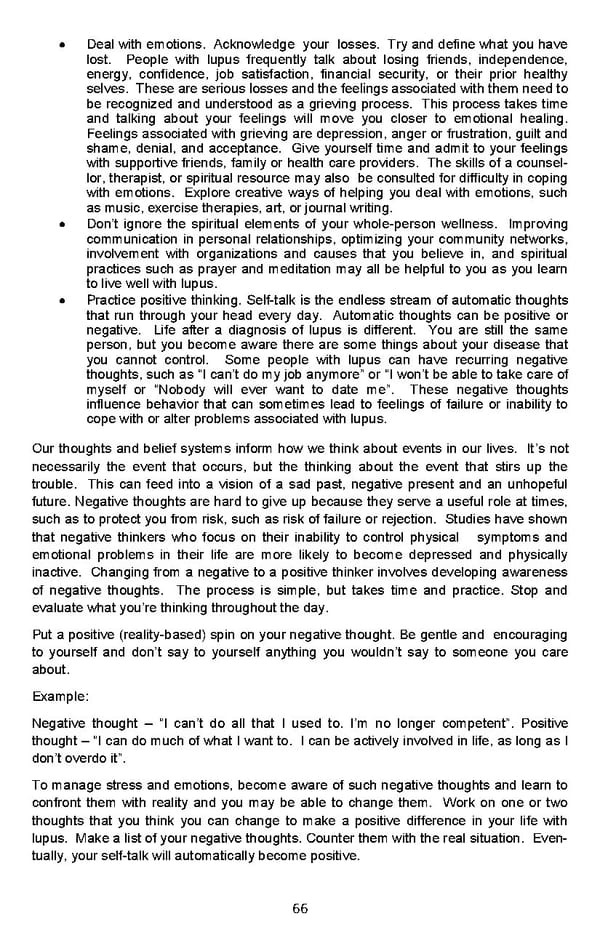• Deal with emotions. Acknowledge your losses. Try and define what you have lost. People with lupus frequently talk about losing friends, independence, energy, confidence, job satisfaction, financial security, or their prior healthy selves. These are serious losses and the feelings associated with them need to be recognized and understood as a grieving process. This process takes time and talking about your feelings will move you closer to emotional healing. Feelings associated with grieving are depression, anger or frustration, guilt and shame, denial, and acceptance. Give yourself time and admit to your feelings with supportive friends, family or health care providers. The skills of a counsel- lor, therapist, or spiritual resource may also be consulted for difficulty in coping with emotions. Explore creative ways of helping you deal with emotions, such as music, exercise therapies, art, or journal writing. • Don’t ignore the spiritual elements of your whole-person wellness. Improving communication in personal relationships, optimizing your community networks, involvement with organizations and causes that you believe in, and spiritual practices such as prayer and meditation may all be helpful to you as you learn to live well with lupus. • Practice positive thinking. Self-talk is the endless stream of automatic thoughts that run through your head every day. Automatic thoughts can be positive or negative. Life after a diagnosis of lupus is different. You are still the same person, but you become aware there are some things about your disease that you cannot control. Some people with lupus can have recurring negative thoughts, such as “I can’t do my job anymore” or “I won’t be able to take care of myself or “Nobody will ever want to date me”. These negative thoughts influence behavior that can sometimes lead to feelings of failure or inability to cope with or alter problems associated with lupus. Our thoughts and belief systems inform how we think about events in our lives. It’s not necessarily the event that occurs, but the thinking about the event that stirs up the trouble. This can feed into a vision of a sad past, negative present and an unhopeful future. Negative thoughts are hard to give up because they serve a useful role at times, such as to protect you from risk, such as risk of failure or rejection. Studies have shown that negative thinkers who focus on their inability to control physical symptoms and emotional problems in their life are more likely to become depressed and physically inactive. Changing from a negative to a positive thinker involves developing awareness of negative thoughts. The process is simple, but takes time and practice. Stop and evaluate what you’re thinking throughout the day. Put a positive (reality-based) spin on your negative thought. Be gentle and encouraging to yourself and don’t say to yourself anything you wouldn’t say to someone you care about. Example: Negative thought – “I can’t do all that I used to. I’m no longer competent”. Positive thought – “I can do much of what I want to. I can be actively involved in life, as long as I don’t overdo it”. To manage stress and emotions, become aware of such negative thoughts and learn to confront them with reality and you may be able to change them. Work on one or two thoughts that you think you can change to make a positive difference in your life with lupus. Make a list of your negative thoughts. Counter them with the real situation. Even- tually, your self-talk will automatically become positive. 66
 Living Well With Lupus Facts Booklet Page 65 Page 67
Living Well With Lupus Facts Booklet Page 65 Page 67